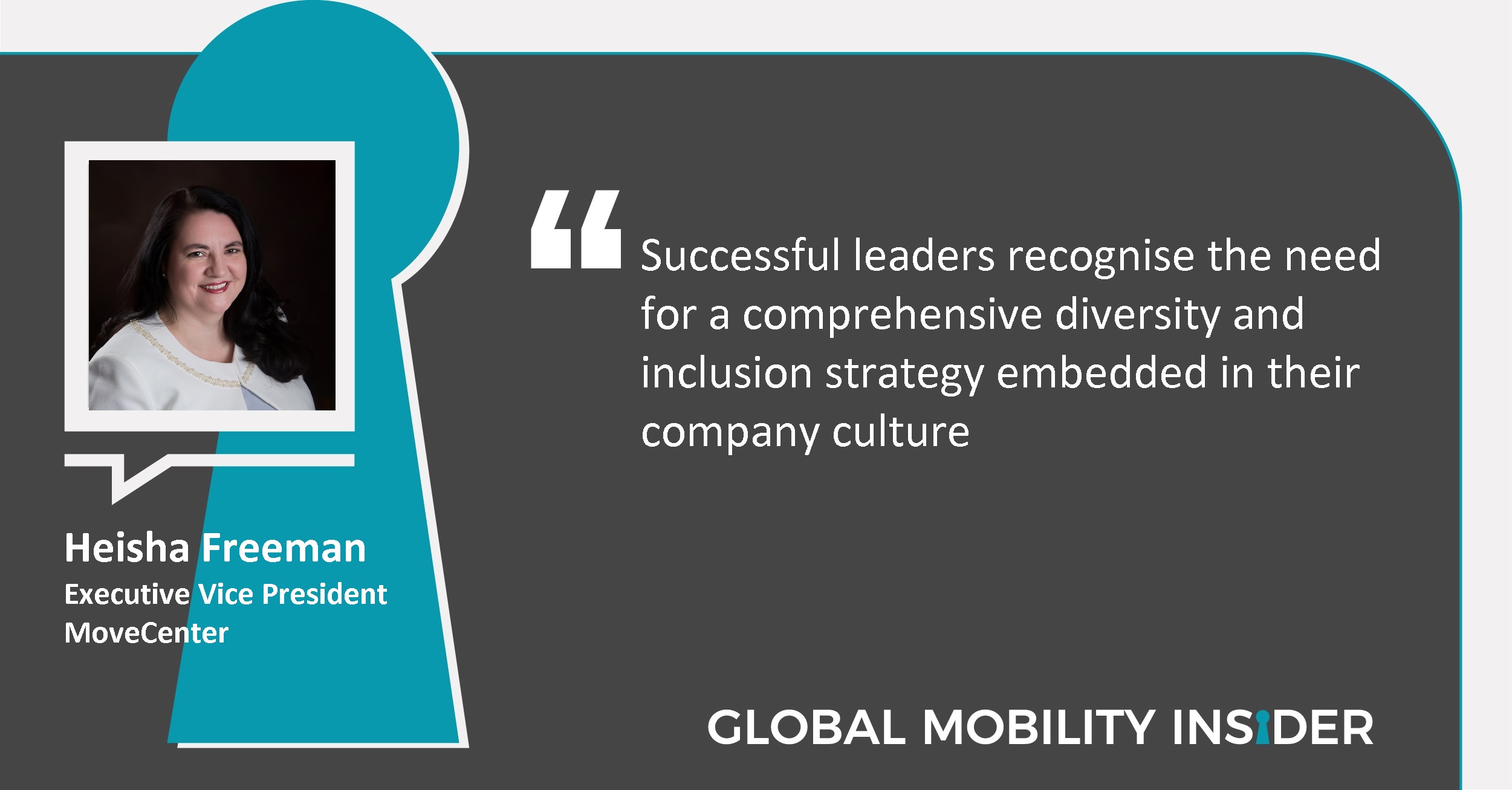Heisha Freeman - Executive Vice President - MoveCenter
Name: Heisha Freeman
Position: Executive Vice President
Company: MoveCenter

Professional Background
MoveCenter, Executive Vice President (United States): 2013 – Present
Before MoveCenter, Heisha worked in a variety of global mobility capacities since 2006, including roles at CapRelo, SIRVA and Bristol Global Mobility. Her previous experience, since 1993, covered a wide variety of industries including investment banking, retail management, brand loyalty marketing, youth shelters and family services, suicide and crisis intervention, animal rescue, advice column and modeling.
Career Insider
Q: Why global mobility, and how did you get started in the industry?
A: I’m a little embarrassed to admit that in my late 20’s, I was a corporate transferee and made it through my entire relocation without ever realising this industry existed. Fast forward to 2006 when the recession adversely affected my husband’s construction business and we needed to become a two-income family. A recruiter contacted me about my resume on Monster.com and with a ‘slap on the forehead ah-ha’ sort of moment, I accepted my first role in the industry doing business development for an RMC. I was very fresh to the industry, but I quickly learned that it was something I enjoyed and wouldn't mind doing long term! Since then, I've learned so much and have advanced to a position where my multidisciplinary role involves setting strategic direction and organisational alignment towards those goals. My responsibilities include sales and marketing and overlap most areas of the company that affect operations including legal, supply chain management, onboarding, billing, and ongoing customer satisfaction. I can’t imagine doing anything else!
Click & Like on LinkedIn
Q: What is 'business as usual' like for you at MoveCenter?
A: At MoveCenter, we pride ourselves in having had 100% employee retention for 15 years and 100% client retention for 25 years (and counting)! Everything we do is geared toward pleasing our clients and transferees while fully supporting our valued employees. That means I never know what I’ll be doing from one day to the next. I can make all the plans in the world, but the moment a client emails or phones, we reschedule our plans to immediately take care of them. I never use an out of office message or auto responder because I am never unreachable or truly out of office – even at 2am. I might be in the midst of responding to a RFP or having a supplier review meeting, but need to switch gears because a client has a need. Last week I flew to three different cities. This morning I helped a client with a last-minute request for data to substantiate adding pet moving to their policy and then I spent the rest of the afternoon in my home office stuffing holiday card envelopes. Tomorrow I’m attending an awards luncheon where our company is a finalist for an ethics award.
Q: What aspect of your work at MoveCenter do you find most exciting?
A: I love that I’m making a difference in people’s lives! My heart has always belonged to animals and children, and they are transferees, too. Even if they never know my name, I know my work at MoveCenter impacts their relocation or assignment experience and subsequently, their lives. This drives me to do my best each and every day. I’m also enjoying working for a stable company that has high-integrity owners who keep promises, both externally and internally. Being part of a healthy workplace environment is the best!
Industry Insider
Q: What do you think is the primary thing hindering the global mobility industry's progress?
A: There are so many disreputable companies in the moving industry that it taints our reputation. Whether it’s a company holding someone’s belongings hostage with a demand for more money, or an otherwise reputable employer who treats employees poorly, they become renowned and sometimes eclipse the good apples. Until our industry can clean itself up and rid ourselves of bad apples, or find a way to distinguish the good apples from the bad, perhaps with some certification or credential that the general public acknowledges, we will be held back to some degree.
Q: What is the most important strategic tip you can give to companies handling global mobility?
A: When looking for a supplier, do not try and match your company’s size to their company size. Instead, match your mobility program size to their experience and capabilities. I have seen the largest volume mobility programs in the world managed very well by very small RMC’s, so don’t discount the smaller suppliers out of hand based on size alone.
Suppliers appreciate it when prospective clients are respectful of the fact that responding to a RFP is both time consuming and expensive. Start with a short RFI that can be quickly answered with yes/no responses to your items of importance. Do you require a relocation consultant who speaks fluent Mandarin Chinese? Perhaps you require an onsite team or that the team be physically located in Dallas, Texas, USA? Do your Risk Management or IT departments have specific requirements that are deal breakers? Whatever your items of importance are, allow us to qualify or disqualify using the least amount of our resources before you issue your RFP to learn in-depth information about how we do what we do.
Then, when you issue your RFP, make sure it is both targeted and intentional. Ask yourself why you are including each question. I have seen the exact same RFPs found online used by multiple companies, many asking questions about program aspects not relevant to their needs. Also, don’t make the mistake of including too many respondents, as it can slow or even halt, the decision process. Then, with your finalists, realising you want us to keep costs down, please don’t give short notice to book flights for best and final presentations. Two weeks or more is appreciated.
Visionary Insider
Q: How can global mobility professionals ensure that they are handling issues of diversity and inclusion appropriately?
A: Diverse and inclusive organisations outperform their competition. We live in a globalised, hyper-connected world where diversity and inclusion initiatives are imperative for companies whose global strategies include high levels of employee engagement, growth initiatives, performance drivers and successful branding. This must be reflected in every aspect of the company, especially global mobility, which is vital to recruiting and retention.
Successful leaders recognise the need for a comprehensive diversity and inclusion strategy embedded in their company cultures. This includes making certain that their corporate diversity and inclusion strategies are evolving alongside global mobility strategies to better meet global business needs.
Q: If you had to pick, which aspect of global mobility is most needing change?
A: Sadly, the commoditisation of our services by procurement departments has become commonplace and largely accepted by mobility stakeholders. Many who think strategically are still locked into a required purchasing process headed by procurement, whose goal is to contract with good to great performing suppliers for the least amount of money. Unfortunately, many stakeholders don't have enough knowledge or any method to effectively measure the value we provide, to combat the commoditisation by their procurement department during a RFP process. Organisations should fully examine the impact a solution can have on their situation and how it can benefit them long-term. The only true measure of value for a for-profit company is how the solution would change that client’s net profit. Ensuring that your organisation has a superior process for making the best decision based on tangible measurement of each prospective suppliers’ unique value is your strongest defence against commoditisation. It can enable you to more successfully partner with the right supplier(s) for your company and win in your competitive market.
Q: What are the major developments you currently see happening in the industry, and how do you feel about them?
A: Each decade seems to have one definitive trend that impacts clients’ relocation policies. With the Great Recession firmly in the past and upside-down mortgages requiring loss on sale benefits no longer necessary in relocation policies, the new trend is the uptick in families with a special needs child impacting the candidates’ ability to relocate. It’s important for the company to work with a supplier who can perform a thorough needs analysis and without violating confidentiality, confer with the employer to offer solutions that are meaningful to the candidate while remaining within the company’s budget.
Either/Or…
- Short-term or long-term assignment? Short-term
- Airbnb or serviced apartments? Serviced apartments
- Excel or global mobility software? Global mobility software
- Lump-sum or flex-ben? Flex-ben
- Facebook or LinkedIn? Facebook
- Outlook or Gmail? Outlook
- Taxi or Uber? Neither. Chauffeured car service
- iOS or Android? Android
- Mac or PC? PC
- Computer or tablet? Computer
- Work hard or play hard? Both!


Leave a Comment
* Fields marked with this asterisk are mandatory.